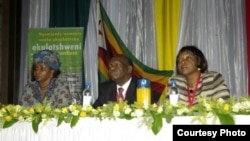MUTARE —
With just a few days to go before the constitutional referendum on Saturday, Manicaland provincial co-chairperson for the parliamentary committee responsible for the draft charter, Senator Cephas Makuyana, says he is worried by the poor public turn out at events called to review the document.
Mr. Makuyana told VOA Studio 7 that the public turn out has not been convincing in some of the areas they visited in the past weeks.
He said political parties have not done enough to mobilize and publicise the outreach programs.
“For the past two weeks political parties have been organising meetings which were poorly attended probably due to the fact that the messages did not reach the majority of the people. I would also believe that some people don’t see any need to attend the meeting because political parties are agreeing on the way forward,” said Makuyana.
But the senator is not deterred by the poor turn-out. He remains optimistic that the draft will sail through regardless of the poor turn-out at most outreach programs.
Chimanimani senator Monica Mutsvangwa, who is the Manicaland provincial COPAC co-chairperson, is upbeat about the whole process.
She told VOA Studio 7 in a telephone interview that the committee has covered most areas.
Manicaland provincial executive member of the National Constitutional Assembly, James Mundenda, said poor attendances at the meetings is due to people’s ignorance on the referendum and related issues.
Mr. Mundenda said some people feel they are being used by politicians in the unity government to rubber stamp a negotiated document.
The COPAC team in Manicaland Province will Wednesday host a media workshop to brief journalists and civic society groups on the draft constitution.
In a related development, with the referendum for a new constitution only a few days away, editors of both private and state-owned newspapers in Zimbabwe have committed themselves to adhering to ethical standards of news coverage to help ensure that peace prevails as the country decides on a new charter with national elections expected later in the year.
The editors, affiliated to the Zimbabwe National Editors Forum, made the resolution at a meeting with members of the parliamentary portfolio committee on media information and communication technology in Gweru on Friday.
Meanwhile, the leader of one of Zimbabwe’s top rights organizations says the retention of the death penalty in the country’s draft constitution is retrogressive, adding there is concern also that the recent appointment of a hangman could mean that convicts on death row may soon be sent to the gallows.
Director of the Zimbabwe chapter of Amnesty International, Cousin Zilala, said his organization is concerned by Harare’s retention of the death penalty in the draft charter.
Some rights groups lobbied during the constitutional outreach phase for the death penalty to be excluded from the new constitution.
Mr. Makuyana told VOA Studio 7 that the public turn out has not been convincing in some of the areas they visited in the past weeks.
He said political parties have not done enough to mobilize and publicise the outreach programs.
“For the past two weeks political parties have been organising meetings which were poorly attended probably due to the fact that the messages did not reach the majority of the people. I would also believe that some people don’t see any need to attend the meeting because political parties are agreeing on the way forward,” said Makuyana.
But the senator is not deterred by the poor turn-out. He remains optimistic that the draft will sail through regardless of the poor turn-out at most outreach programs.
Chimanimani senator Monica Mutsvangwa, who is the Manicaland provincial COPAC co-chairperson, is upbeat about the whole process.
She told VOA Studio 7 in a telephone interview that the committee has covered most areas.
Manicaland provincial executive member of the National Constitutional Assembly, James Mundenda, said poor attendances at the meetings is due to people’s ignorance on the referendum and related issues.
Mr. Mundenda said some people feel they are being used by politicians in the unity government to rubber stamp a negotiated document.
The COPAC team in Manicaland Province will Wednesday host a media workshop to brief journalists and civic society groups on the draft constitution.
In a related development, with the referendum for a new constitution only a few days away, editors of both private and state-owned newspapers in Zimbabwe have committed themselves to adhering to ethical standards of news coverage to help ensure that peace prevails as the country decides on a new charter with national elections expected later in the year.
The editors, affiliated to the Zimbabwe National Editors Forum, made the resolution at a meeting with members of the parliamentary portfolio committee on media information and communication technology in Gweru on Friday.
Meanwhile, the leader of one of Zimbabwe’s top rights organizations says the retention of the death penalty in the country’s draft constitution is retrogressive, adding there is concern also that the recent appointment of a hangman could mean that convicts on death row may soon be sent to the gallows.
Director of the Zimbabwe chapter of Amnesty International, Cousin Zilala, said his organization is concerned by Harare’s retention of the death penalty in the draft charter.
Some rights groups lobbied during the constitutional outreach phase for the death penalty to be excluded from the new constitution.



















